Outfitting Waste Workers: Testimonies of a Safer, More Equitable Waste Sector in the Philippines
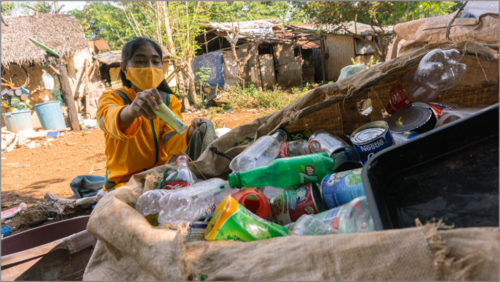
Uniforms can hold numerous benefits: protection, a professional image, or a sense of equality. However, informal workers—more than two billion people and over 60 percent of the world’s adult workforce—are seldom afforded the opportunity to wear a uniform and experience the benefits that it can hold.
Despite informal waste collectors’ roles as frontline city workers and one of the world’s greatest current defenses against ocean plastic pollution, they are commonly overlooked and under-resourced. Communities often see waste collection as a desperate source of daily living; waste collectors often face social stigma and even harassment. USAID’s Clean Cities, Blue Ocean program, in partnership with local grantees, is challenging these beliefs by empowering waste collectors and increasing their access to the resources and recognition they deserve.
In early 2021, USAID grantee, Project Zacchaeus (PZC), launched Project Eco Kolek—a partnership with sixty local informal waste collectors in Puerto Princesa, Philippines, to develop a safer, more sustainable waste collection system. The project is founded on the belief that by supporting and empowering local waste collectors, they can be transformed into “Eco-Warriors”—recognized and respected essential service providers who keep their communities clean. Through Eco Kolek, members receive empowerment and skills training, as well as simple tools and resources, like uniforms and improved bicycles and vehicles for waste collection. With these resources, local “Eco-Warriors” can emerge as a professionalized group that communities see with less stigma and recognize for their essential roles in keeping communities clean and plastics out of the environment.
The USAID grant supported many activities, including the design and development of the Eco-Warriors’ uniforms–a critical and foundational component of the Eco-Warrior’s journey. Launched early in the grant, developing uniforms was not only a critical step in increasing waste collectors’ safety, but also a way to build comradery and trust within the group. The participatory design process—with and for the Eco-Warriors—aimed to increase their health and safety while also professionalizing their essential line of work.
photo
Creating a Participatory and Democratic Environment for Co-Creation
Beginning in February 2021, 40 Eco-Warriors in Barangay (the most local level of government, in Tagalog) Bancao-Bancao, Puerto Princesa began working with Project Eco Kolek and a local designer from the Seaside Tailors Association, a volunteer and community-based group, to begin crafting the uniforms. Group meetings and co-creation sessions gave all members of the group a voice. The sessions enabled the Eco-Warriors to draw from their experiences collecting waste to identify key design components, ensuring that the final product would be practical and embraced by the group:
- Color – Due to the amount of dirt and dust they are exposed to on the job, some Eco-Warriors wanted dark blue (royal or navy) or green uniforms, while others preferred vibrant red, orange, and yellow colors.
- Overall cut – To ensure extra protection from dirt and direct sunlight, the Eco-Warriors wanted long sleeves and pants.
- Pockets – They also wanted pockets on both sides of the front of the shirt for ample storage.
- Reflectors – To protect themselves from vehicle accidents, the Eco-Warriors wanted reflectors on the uniforms.
The recommendations were consolidated and worked into eight draft sketches, of which the Eco-Warriors were asked to select and explain the rationale behind their top four choices.
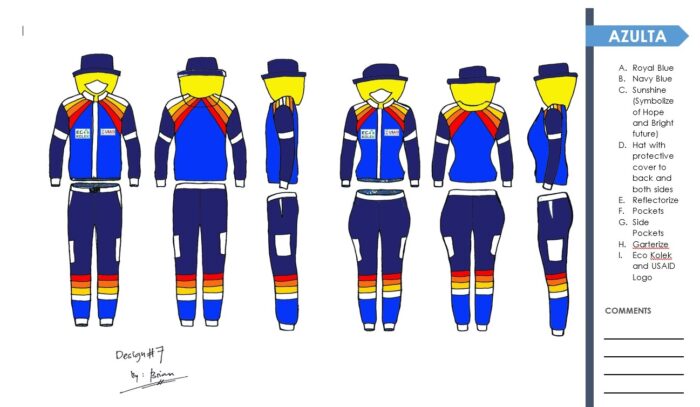
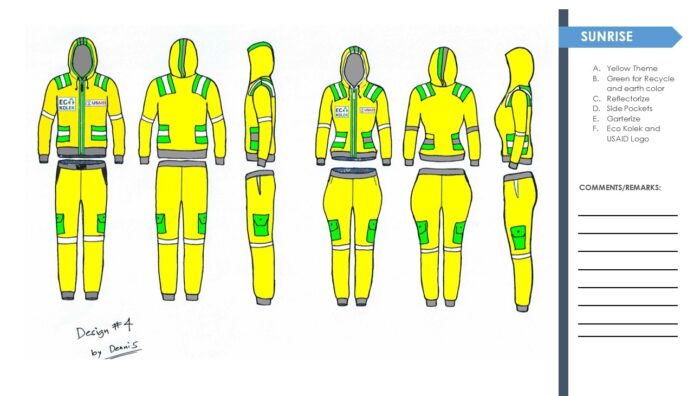
Once the top designs were identified, PZC presented them to the Eco-Warriors for final approval and held an open-floor discussion enabling the group to incorporate any additional changes and ideas. Afterward, local tailor shop Seaside Tailors (a local tailor shop that was inspired to partner with PZC because of the project’s inspiring vision), took measurements and began production. To ensure complete protection and follow industry best practices, the tailors also crafted gloves and face masks to complement the uniforms, and the Eco-Warriors were issued face shields and closed-toed shoes.
Eco-Warriors’ Experiences
In October 2021, the uniforms were completed and distributed to the Eco-Warriors. Since being outfitted, the Eco-Warriors have shared four major ways that the uniforms have begun changing their experiences as waste collectors. These experiences range from feeling safer and more protected carrying out their work to increased attention and respect from members of the community.
Reduced Health and Safety Risks
Handling waste poses many health risks, and informal waste collectors are often exposed to contaminants and hazardous materials. In Puerto Princesa specifically, the hot climate and daily sun add to the danger. After receiving the uniforms, many members of the group immediately started noticing changes in their daily work.
“Wearing this uniform is a dream for me! This job makes us susceptible to sickness and injury because we work under the sun or in the rain. We are not protected by the ordinary clothes we wear, but now, things have started to change because of the Eco Kolek project.” – Eco-Warrior Remedios.
Reduced Stigma
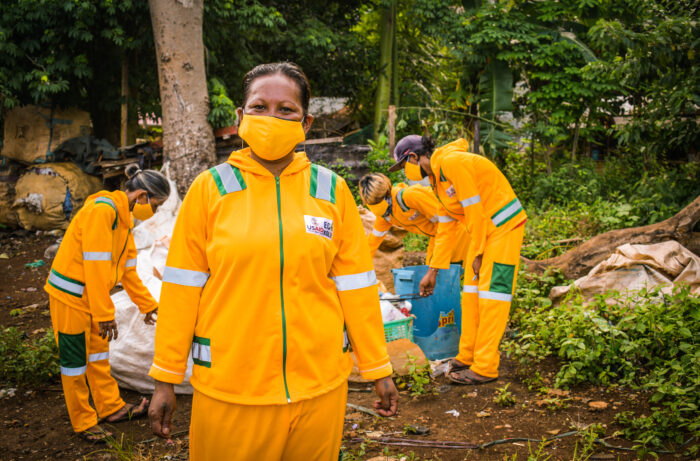
“I feel proud to wear my uniform as an Eco-Warrior. I know that people will appreciate me because now I look clean, especially with the hat, gloves, and the tools I use to pick through the waste. I feel relieved because now my health is one of the priorities of the Eco Kolek project. Today, I am no longer ashamed of my job because our welfare is being prioritized.” – Eco-Warrior Roselyn
Empowered Eco-Warriors as Community Leaders
“This uniform makes me feel important and will enable us, the Eco-Warriors, to become the communities’ first choice for plastic collection in their households. The mentorship sessions made me feel empowered and improved my self-confidence because I know that these uniforms and tools will help us gain the trust of many people.
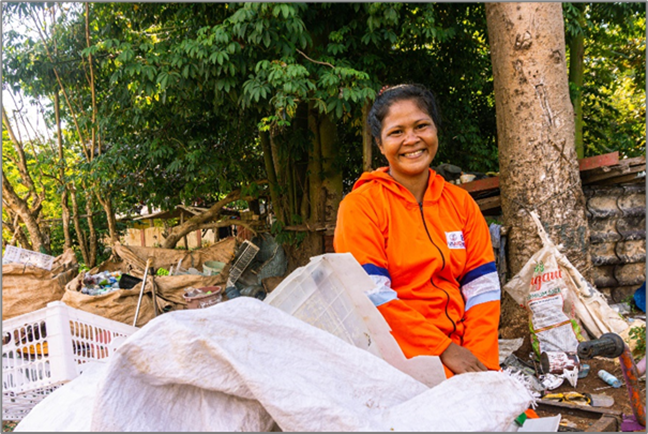
They will no longer see me as a low-class citizen, but will see me with respect instead. People will now look to Eco-Warriors as their leaders in making our communities cleaner and notice our more professional look.” – Eco-Warrior Dominga
Building Self-Confidence
“My husband works in a junk shop and when he saw me in my Eco-Warrior uniform, he told me he also wants to join. My daughter said, ‘You look amazing, Ma!’
When my friends in the community saw me wearing the uniform, they were surprised and started to change their perception about waste collectors, viewing our job as honorable.
I now feel like a celebrity walking down the streets in my uniform – it gives me so much confidence!” – Eco-Warrior Remedios
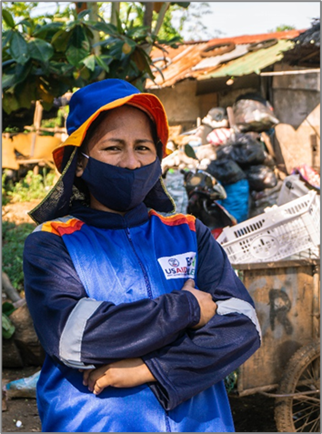
“My daughter was so excited about my uniform and asked, ‘Mom, can I fit into your Eco-Warrior uniform?’ I just smiled and she got more excited when I told her that it comes in blue, yellow, orange, and green!” – Eco-Warrior Dominga
The design process and production of the uniforms, as well as the protection and professionalization they provide, have started building community awareness of the Eco-Warriors’ vital roles and mark Project Zacchaeus and USAID’s first step toward changing the social stereotypes of informal waste collectors.
Learn more about the Eco-Warriors.

